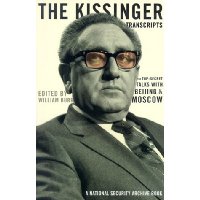| 商家名称 |
信用等级 |
购买信息 |
订购本书 |
|
|
 |
The Kissinger Transcripts: The Top-Secret Talks With Beijing and Moscow |
 |
|
 |
The Kissinger Transcripts: The Top-Secret Talks With Beijing and Moscow |
 |

基本信息·出版社:I B Tauris & Co Ltd
·页码:515 页
·出版日期:2000年02月
·ISBN:1565845684
·条形码:9781565845688
·装帧:平装
·外文书名:基辛格中美, 美苏会谈揭秘
内容简介 Now in paperback, a "fascinating trove" (Jonathan Spence, New York Review of Books cover review) of transcripts of some of Kissinger's most secret conversations with world leaders. Considered "among the most important Cold War records to emerge thus far" by the former Beijing bureau chief of the New York Times, The Kissinger Transcripts gives us the unvarnished record of Henry Kissinger's diplomacy during the Nixon years. Here are the transcripts, formerly classified "Top Secret/Sensitive," of Kissinger's talks with Mao Zedong, Zhou Enlai, Deng Xiaoping, Leonid Brezhnev, Andrei Gromyko, and others. The Kissinger Transcripts lets readers make up their own minds about the most controversial Secretary of State in modern U.S. history.
作者简介 William Burr, a senior analyst at the National Security Archive and director of the Archive's Nuclear Documentation Project, is co-author of Atomic Audit. The National Security Archive is a nonprofit research library of declassified U.S. Government Documents in Washington, D.C. A project of the Fund for Peace, the Archive obtains and disseminates the U.S. government documents that are indispensable for informed public debate.
媒体推荐 书评
Amazon.com Henry Kissinger brought a near-obsessive sense of secrecy to the execution of his duties as secretary of state during the administrations of Richard Nixon and Gerald Ford, and took steps to ensure that this secrecy would continue even after he left office. Much of his paperwork is under seal at the Library of Congress, making use of a loophole in the Freedom of Information Act to keep the material away from prying researchers.
The Kissinger Transcripts is based, then, on files obtained from the National Archive and the State Department.
The conversations with Soviet and Chinese officials reproduced here do not contradict the accounts in Kissinger's memoirs so much as they show just how much he omitted in his version of events. For example, Nixon and Kissinger, willing to bend U.S. foreign policy in a pro-China direction, made a stunning offer in 1971 to the Chinese Ambassador to the United Nations: "We would be prepared at your request, and through whatever sources you wish, to give you whatever information we have about the disposition of Soviet forces. I don't have it with me, but we can arrange it easily wherever you wish and in an absolutely secure way."
There are some interesting human touches, which, along with the historical data, make an invaluable contribution to our understanding of Kissinger's role in world politics. In 1972, he tells the Chinese UN ambassador that (then UN ambassador) George Bush needs "more backbone;" in sporadic appearances throughout the transcripts, the future president doesn't do much to nullify that appraisal. In a Beijing meeting, Mao tells his American audience that he enjoys his reputation for troublemaking:
"You must say that Chairman Mao is an old bureaucrat and in that case I will speed up and meet with you. In such a case I will make haste to see you. If you don't curse me, I won't see you, and I will just sleep peacefully.... I will only be happy when all foreigners slam on tables and curse me."
And then there's Nixon's appraisal of his globetrotting diplomat and ladies' man: "the only man in captivity who could go to Paris 12 times and Peking once and no one knew it, except possibly a couple of pretty girls."
--This text refers to an out of print or unavailable edition of this title. Max Frankel, New York Times Book Review A welcome trespass on terrain that the former Secretary of State still treats as his private preserve. [The Kissinger Transcripts] properly reclaim at least a portion of the record that should have long since become public property.
Los Angeles Times New information [and] lighter moments in superpower diplomacy.
From AudioFile This ambitious audiobook is an attempt to represent some of the conversations that Henry Kissinger had with American, Russian and Chinese foreign policy officials during the late 1960's and early 1970's. These conversations had been classified and concealed until they were wrestled free by Burr, who has selected the most significant parts of thousands of pages of memoranda of conversations. The troupe of actors does a good job with difficult material. The reading is clear and dramatic, and foreign names are never mispronounced. Theodore Bikel's performance as Kissinger is quite convincing; one thinks that Kissinger himself is on the audiobook. M.L.C. (c) AudioFile, Portland, Maine
--This text refers to an out of print or unavailable edition of this title. International Herald Tribune Graphic. [The Kissinger Transcripts] shows that President Richard Nixon's triangular diplomacy...involved a much higher level of U.S. strategic assistance to China than has been acknowledged officially.
Associated Press Conversations that may have changed history.
Jonathan Spence, New York Review of Books, cover review An absorbing book [full of] remarkable material on both Mao Zedong and Brezhnev.




